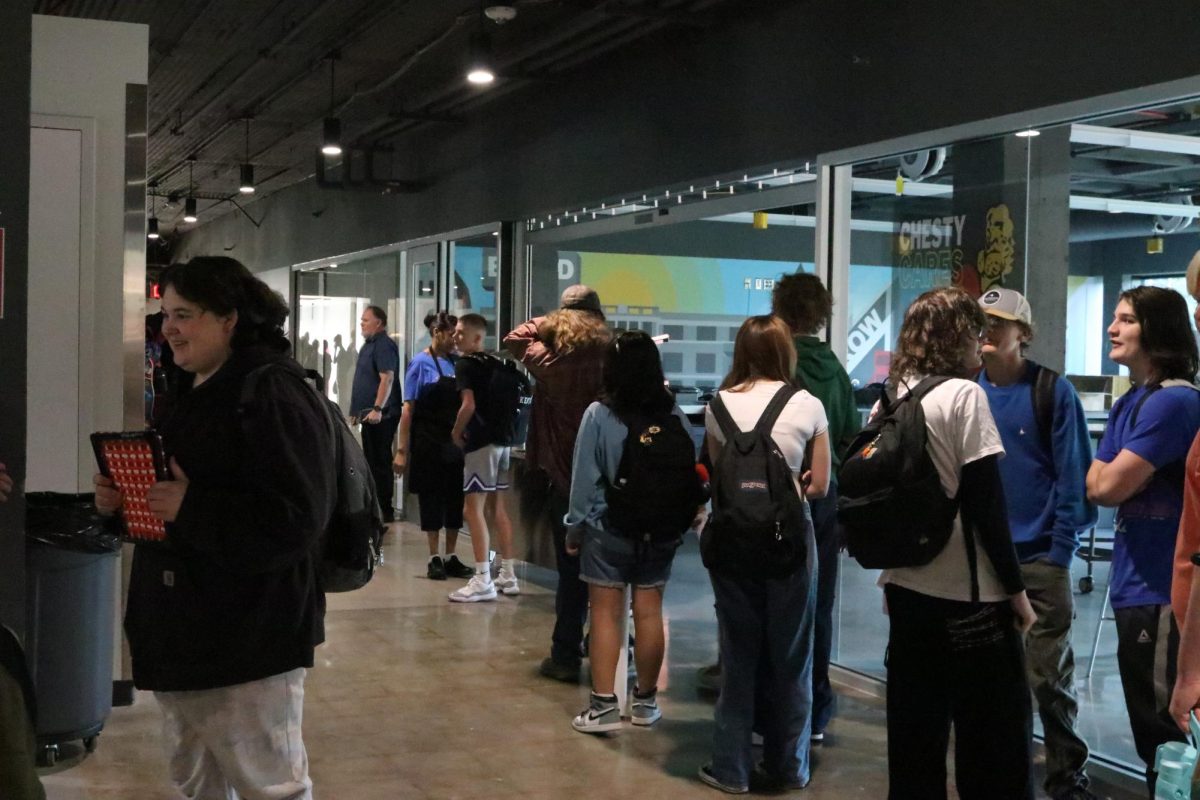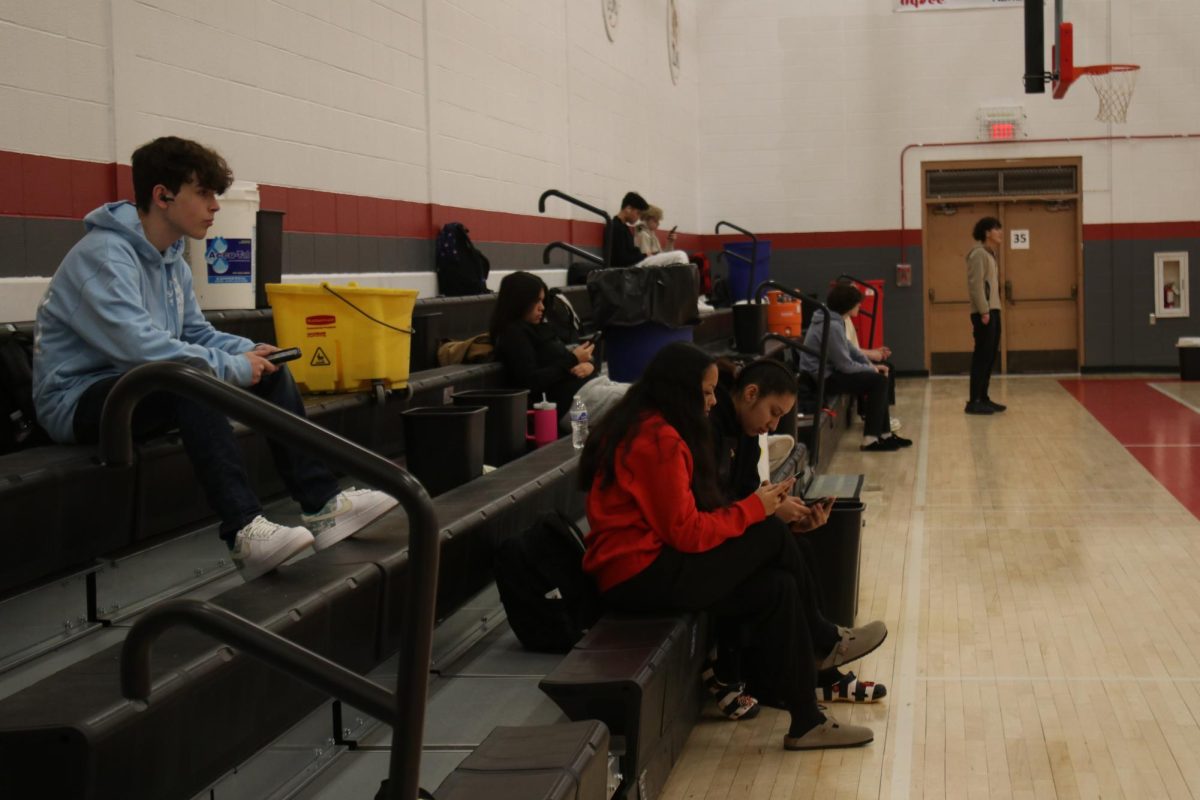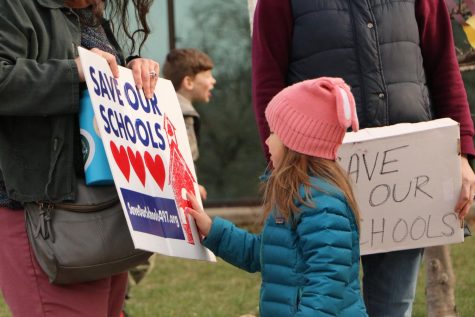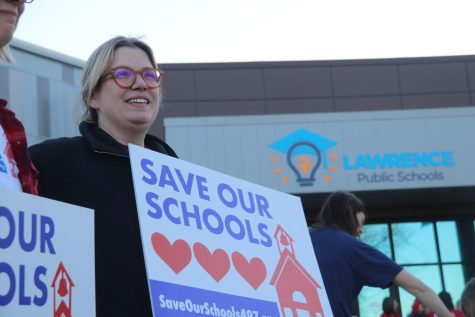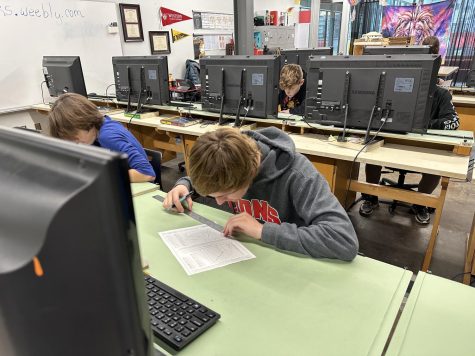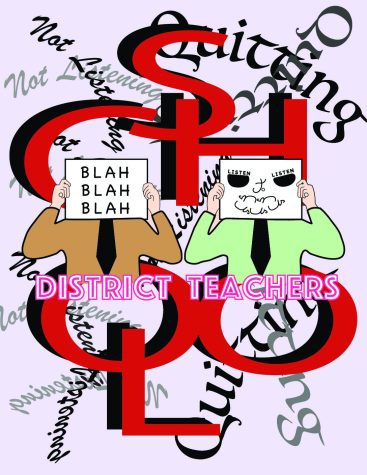All about the money
How the budget committee has failed students in favor of admin
March 23, 2022
The district budget task force has failed at thoroughly processing all proposals and has completely abandoned all pretense of being student-focused. Their actions show that they value administrative resources over educator and child wellbeing.
As the effects of the deficit have begun to grow, the district has looked for ways to eliminate waste and create a stable budget. A suggested cancellation to gymnastics at both high schools was followed by large student action which has increased public attention to the issue.
Many parents and teachers have called for the board to listen to them and include the community in the conversation. So far these cries have fallen on deaf ears. The district instead has solely trusted a task force to supply them with ideas for budget cuts.
The Budget and Program Evaluation Committee, or BPEC, is the USD 497 group devoted to solving the budget deficit by reviewing public school funding, monitoring current district balances, and processing and presenting solutions.
BPEC is divided into nine subcommittees. Each subcommittee was tasked with creating three solutions minimum for the deficit. The committees held brainstorming periods, made pros and cons lists and gathered data on district funding to weigh possible solutions. The committee vowed to be as thorough as possible when reviewing ideas.
One BPEC subcommittee focused on administration. The committee is headed up by administrators themselves, with a few district office officials in attendance. On the administration subcommittee evaluation page, numerous proposals were made concerning administrative salary, all of which were noted in the ideas section during the first meeting. The ideas noted were a re-evaluation of admin wage numbers, a cut off at 100,000 dollars for admin salary and a 10% cut to all administrative salaries.
The principle that BPEC held itself to was to group similar ideas together and evaluate them as a whole. But no cluster concerning admin salary is noted anywhere else on any district file. None of the ideas about salary reduction received any additional consideration by BPEC.
No pros and cons about cutting salaries, no rating on the three scales to weigh the overall effect on students and no calculation of money saved presented on the subcommittee’s evaluation. Why?
If the money saved from administrative salary cuts wasn’t worth looking at, why was that not shown and proved publicly? I decided to run the numbers myself using the estimated salaries and job numbers from the 2021-2022 school year, provided in the extra data section of the BPEC admin file.
After a 10% cut to all 2021-2022 admin salaries, the district would save an estimated $635,506. Leveling the remaining salaries that were over $100,000 at exactly $100,000, as proposed, would bring the overall amount saved to $788,357. Even after these cuts, some administrators would still be making almost two times that of teachers and retaining benefits of a high amount.
The 10% projection saves more money than the final proposed reductions to All-City choir, novice band, novice orchestra, club sponsorship, and gymnastics. It also does so without firing a single employee, relocating a single child or ousting a single teacher.
This, according to BPEC’s mission, is the ideal goal of all proposals.
In all of the evaluation forms, the subcommittees are recommended to always stay student and learning focused and to try to refrain from cutting staff. In actuality, all of the administration subcommittee’s final proposals involve changing staff and cutting employees, including the finalized thresholds set at the March 22 meeting.
The proposal has no real effect on student wellbeing in the classroom, teacher resources or quality of learning. The only real outcome would be that some inflated salaries of admin are downsized for the benefit of the district. It’s not unfair to say that the committee, the only people directly affected by the proposal, has a large bias.
It’s entirely possible that cutting admin salaries in this way is unfair and won’t contribute to fixing the deficit. Maybe it truly will ruin the job market by lowering admin salaries and we won’t be able to replace the people who leave for more money elsewhere. However, I would like to reiterate that it is not the burden of a high school reporter to analyze potential solutions of the budget deficit and weigh their effectiveness. It’s BPEC’s job. And the fact that this idea wasn’t even documented after the first meeting, reveals that the committee has not functioned correctly.
If the 10% idea doesn’t work, that should have been explored in the meetings and it should have been a publicly displayed projection. It doesn’t exactly seem like a coincidence that they chose to focus elsewhere.
If teachers are going to have to work around all of the changes coming towards them, then the administration should make many more changes than proposed in order to share that burden.
Earlier this school year, the district swore to “cut in further” to the budget in order to improve staff compensation and retention, but if that cut comes from the school’s resources and education based money and not from the administration themselves, then nothing truly changes. The district suffers, teachers are paid marginally better at the expense of education quality and administration doesn’t contribute.
Their notion of casually threatening to leave because they might get paid less than other districts is a slap in the face to the teachers who have put their lives into education in this district and worked twice as hard for half the pay.
If a salary cut doesn’t happen soon, then high level administration will continue to suck up money for their salaries until we are forced to lower it and then they’ll leave anyway. Their notion of casually threatening to leave because they might get paid less than other districts is a slap in the face to the teachers who have put their lives into education in this district and worked twice as hard for half the pay.
Another noteworthy angle of the budget situation is the declining number of available paraeducators. Paraeducators aren’t even paid $15 an hour despite the fact that they are essential to the education of many children. As the quality of work and amount of pay for paras continue to deteriorate, the number of future paras decreases in a similar fashion. If para conditions are not improved then we will be facing a major crisis soon.
Why is it essential that we keep administrative salaries high to maintain competitiveness if we don’t even try to do the same for paras and teachers? Are actual, in the classroom educators not just as important to the education of children as administration? Even if other districts pay paras as poorly as we do currently, USD 497 needs to put its foot down and carve its own path. The same goes for admin. Just because other districts pay administration so much money doesn’t mean we can’t change our patterns and set a better standard.
The district has referenced plans to perform a full analysis of administrators salaries to re-evaluate theway wages are set for administrators. But unless this analysis is completely transparent and performed by non-administrators, the bias is still evident.
The district would argue that legal confidentiality surrounding staff salaries means that any wage numbers can’t be discussed outside of negotiations. I would point out that the three percent increase to staff salaries being estimated at 3.5 million was completely public. If you can publicly provide the estimate for the 3% increase , i don’t it’s unfair to ask for the same regarding administrator salary statistics.
With all of the turmoil surrounding COVID, the budget deficit and the general calamity that the past few years have brought, this lack of integrity by the district administration honestly isn’t surprising. The school board needs to put its students and educators first and explore every possible solution, even the proposals that affect admin salaries.
If a high school gymnastics team is fair ground for cuts then administrative salaries certainly are as well. I think it is fair to say that student resources and activities should be valued more than administrative commodities. But BPEC hasn’t actually held these principles, despite the fact that they literally set them for themselves.
As a child of two teachers I personally understand the difficulties that this year has brought on everyone in the district. Educators throughout the district are exhausted, and the strain of the pandemic has pushed many to the edge. I understand that this
overwhelming stress applies to the whole LPS community, even administration, and a cut to their salaries may seem unfair at a time like this. But it deserves consideration from the entire community, not just from a focus group or committee behind closed doors.
If the community isn’t vocal, if public concerns aren’t heard, then the crisis we face will be even worse come next August. If you care about your program or school or even your job then please act.
Assistant principals, directors, superintendents and our admin are absolutely essential to the wellbeing of children in Lawrence schools. But if the administrative leadership of USD 497 can’t set aside their personal bias to fully analyze all possible solutions as they were instructed, then BPEC isn’t working, and the budget crisis will be solved at the sole expense of students and educators.
Movements like Save our Schools are especially vital during this crisis. Their voices helped stop the closure of schools, at least temporarily. If the community isn’t vocal, if public concerns aren’t heard, then the crisis we face will be even worse come next August. If you care about your program or school or even your job then please act. Don’t just share a post on facebook or like a tweet. Step up to the microphone during public comment. Protest in the bitter cold outside the district office. Protect the wellbeing of students and their educators at all costs rather than blindly trust their overpaid superiors. Be critical, not compliant.







